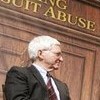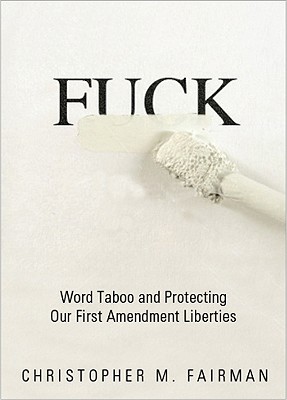Stanley Eugene Fish is an American literary theorist, legal scholar, author and public intellectual. He is currently the Floersheimer Distinguished Visiting Professor of Law at Yeshiva University's Benjamin N. Cardozo School of Law in New York City. Fish has previously served as the Davidson-Kahn Distinguished University Professor of Humanities and a professor of law at Florida International University and is dean emeritus of the College of Liberal Arts and Sciences at the University of Illinois at Chicago.

Yeshiva University is a private Orthodox Jewish university with four campuses in New York City. The university's undergraduate schools—Yeshiva College, Stern College for Women, Katz School of Science and Health, and Sy Syms School of Business—offer a dual curriculum inspired by Modern–Centrist–Orthodox Judaism's hashkafa (philosophy) of Torah Umadda, combining academic education with the study of the Torah. While the majority of students at the university identify as Modern Orthodox, many students, especially at the Cardozo School of Law, the Sy Syms School of Business, and the Ferkauf Graduate School of Psychology, are not Jewish.
Critical legal studies (CLS) is a school of critical theory that developed in the United States during the 1970s. CLS adherents claim that laws are devised to maintain the status quo of society and thereby codify its biases against marginalized groups.
Innocence Project, Inc. is a 501(c)(3) nonprofit legal organization that is committed to exonerating individuals who have been wrongly convicted, through the use of DNA testing and working to reform the criminal justice system to prevent future injustice. The group cites various studies estimating that in the United States between 2.3% and 10% of all prisoners are innocent. The Innocence Project was founded in 1992 by Barry Scheck and Peter Neufeld who gained national attention in the mid-1990s as part of the "Dream Team" of lawyers who formed part of the defense in the O. J. Simpson murder case.

The Georgetown University Law Center is the law school of Georgetown University, a private research university in Washington, D.C. It was established in 1870 and is the largest law school in the United States by enrollment and the most applied to, receiving more full-time applications than any other law school in the country.

Benjamin Nathan Cardozo was an American lawyer and jurist who served on the New York Court of Appeals from 1914 to 1932 and as an Associate Justice of the Supreme Court of the United States from 1932 until his death in 1938. Cardozo is remembered for his significant influence on the development of American common law in the 20th century, in addition to his philosophy and vivid prose style.

Benjamin N. Cardozo High School is a public high school in the Bayside neighborhood of Queens, New York City. The school was named for Benjamin N. Cardozo, who served as justice of the U.S. Supreme Court and chief judge of the New York Court of Appeals. It is operated by the New York City Department of Education.
Fashion law is a specific field of law that deals with legal issues that impact the fashion industry. Fundamental issues in fashion law include intellectual property, business and finance, with subcategories ranging from employment and labor law to real estate, international trade and government regulation. Fashion law also includes related areas such as textile production, modeling, media, cosmetics and perfume industries, questions of safety and sustainability, dress codes and religious apparel, consumer culture, privacy and wearable tech, and civil rights.

The Benjamin N. Cardozo School of Law is the law school of Yeshiva University. Located in New York City and founded in 1976, the school is named for Supreme Court Justice Benjamin N. Cardozo. Cardozo graduated its first class in 1979. An LL.M. program was established in 1998. Cardozo is nondenominational and has a secular curriculum, in contrast to some of YU's undergraduate programs. Around 320 students begin the J.D. program per year, of whom about 57% are women. In addition, there are about 60-70 LL.M. students each year. Cardozo is ranked 52nd in the nation by U.S. News & World Report 2023.

Lester Brickman is an emeritus professor at the Benjamin N. Cardozo School of Law of the Yeshiva University and a legal scholar. He is one of the founding faculty members of the Cardozo, recruited by Yeshiva University in 1976 from the University of Toledo College of Law. On May 31, 2016, Professor Brickman received the Monrad Paulsen Award of the Cardozo School, upon his retirement from teaching. He taught contracts, legal ethics and Land Use and Zoning at the Cardozo School of Law. He is the author of a book, Lawyer Barons: What Their Contingency Fees Really Cost America, a detailed critique of perceived abuses and excessive costs of the American tort system, with proposals for reform. Brickman is a graduate of Carnegie Mellon University. He holds a juris doctor degree from the University of Florida and an LLM degree from Yale Law School.
Judah David Bleich is an authority on Jewish law and ethics, including Jewish medical ethics. He is a professor of Talmud at the Rabbi Isaac Elchanan Theological Seminary, an affiliate of Yeshiva University, as well as head of its postgraduate institute for the study of Talmudic jurisprudence and family law. At Yeshiva University, he holds the Herbert and Florence Tenzer Chair in Jewish Law and Ethics. He also teaches at Cardozo Law School. He is married to Dr. Judith Bleich, a historian of 19th-century European Jewry.

John Jay Osborn Jr. was an American author, lawyer and legal academic. He is best known for his bestselling novel The Paper Chase published in 1971.
Peter Goodrich is a Professor of Law at the Benjamin N. Cardozo School of Law, Yeshiva University. He is the managing editor of Law and Literature and serves on the editorial board of Law and Critique. He is co-editor of the critical legal studies book series 'Discourses of Law' published by Routledge. Peter Goodrich was one of the founding academic staff in the Birkbeck Law School.

The China Quarterly (CQ) is a British double-blind peer-reviewed academic journal established in 1960 on contemporary China including Taiwan.

Joseph Anthony Greenaway Jr. is an American lawyer who serves as a United States circuit judge of the United States Court of Appeals for the Third Circuit and previously sat on the United States District Court for the District of New Jersey. On February 9, 2010, he was confirmed to his seat on the Third Circuit, filling the vacancy created by Justice Samuel Alito's elevation to the United States Supreme Court. Greenaway had been mentioned as a possible candidate for the Supreme Court by President Barack Obama.
Peter Tillers, American scholar of the law of evidence, was born in Riga, Latvia, in 1943 and arrived in the United States in 1950. He was educated at Yale and Harvard Law School. He was Professor of Law at Cardozo Law School, New York, from 1986. He died on October 3, 2015.
During his only term in office, President Herbert Hoover appointed three members of the Supreme Court of the United States: Chief Justice Charles Evans Hughes, and Associate Justices Owen Roberts and Benjamin Cardozo. Additionally, with his failed nomination of John J. Parker, Hoover became the first president since Grover Cleveland to have a Supreme Court nomination rejected by the United States Senate.

Fuck: Word Taboo and Protecting Our First Amendment Liberties is a nonfiction book by law professor Christopher M. Fairman about freedom of speech, the First Amendment to the United States Constitution, censorship, and use of the word fuck in society. The book was first published in 2009 by Sphinx as a follow-up on the author's article "Fuck", published in 2007 in the Cardozo Law Review. It cites studies from academics in social science, psychoanalysis, and linguistics. Fairman establishes that most current usages of the word have connotations distinct from its meaning of sexual intercourse. The book discusses the efforts of conservatives in the United States to censor the word from common parlance. The author says that legal precedent regarding its use is unclear because of contradictory court decisions. Fairman argues that once citizens allow the government to restrict the use of specific words, this will lead to an encroachment upon freedom of thought.
William Ury is an American author, academic, anthropologist, and negotiation expert. He co-founded the Harvard Program on Negotiation. Additionally, he helped found the International Negotiation Network with former President Jimmy Carter. Ury is the co-author of Getting to Yes with Roger Fisher, which set out the method of principled negotiation and established the idea of the best alternative to a negotiated agreement (BATNA) within negotiation theory.
Feminism in Israel is a complex issue in contemporary Israeli society due to the varied demographic makeup of the country and the country's particular balance of religion and state issues. For secular Israeli women, the successive campaigns for women's rights and equality reflect a similar timeline and progression as Western democracies. For Israeli Arabs, however, the issue of feminism is strongly linked to Palestinian causes. And for Orthodox Jews, selected women's rights and women's representation in the Israeli Parliament are recently debated issues.









